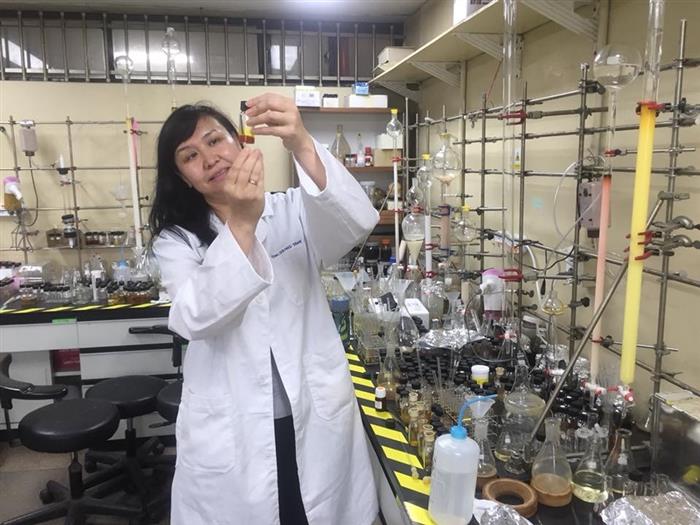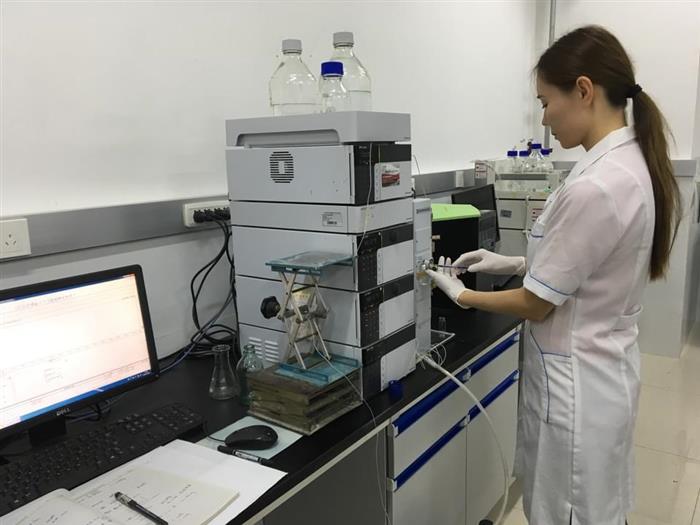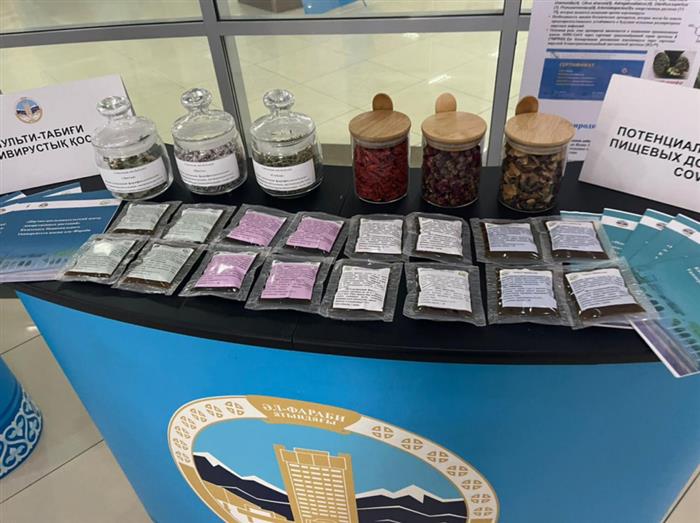- Main page
- News
KAZAKH SCIENTIST PREPARES ANTI-VIRUS TINS
7/14/2021
Phytotherapy is one of the oldest methods of treatment. According to the World Health Organization, alternative treatments have recently become popular. Among them is the field of herbal medicine, which is the basis of our topic today. According to Zhanar Zhenis, director of the Center for the Study of Medicinal Plants at Al-Farabi Kazakh National University, there are herbs with antiviral properties in the country.
- Our research area is medicinal and edible plants growing in Kazakhstan. There are fruits in it, - says Zhanar. - We are currently studying wormwood (Artemisia L.) in the center. In this regard, we have published international scientific articles. More than 81 species of wormwood grow in the country. 19 species are endemic. It takes at least 2-3 years to fully study a plant. Currently, the plants studied by researchers of the center are wormwood species in Almaty region and around East Kazakhstan. For example, in comparison with the species of wormwood grown in Kazakhstan and those grown abroad, there are 60-70% similarities, but 20-30% differences.

According to the director of the center, in most cases, scientists study only one of the properties of plants, and plants are not fully studied.
- And we first study the polar, non-polar compounds and determine their biological activity by taking a total extract from medicinal plants and then separating them with different solvents. Flowers and fruits of various medicinal plants are widely used in cosmetics, food and pharmaceuticals, in the preparation of biologically active additives, - says Ms. Zhanar.
In the course of the research, the specialists of the center will consider such various areas in detail.
- Undergraduate, graduate and doctoral students also take part in research on medicinal plants growing in Kazakhstan. The Center for Medicinal Plants Research has research projects on the fundamental study of wormwood for 2017-2022. In addition, we are conducting research in the field of medicinal plants for the treatment of skin diseases. We are working with Griffith University in Australia on this project. Because we do not have the ability to determine the activity of the plant in connection with skin diseases, it is determined only abroad, - says the scientist.
According to the head of the center, the study of plant extracts with Griffith University showed that it was very active. KazNU doctoral student Aidana Kudaibergen took part in the project "Young Scientist" and won a project worth 54 million tenge. Zhanar Zhenis said that the students worked hard to achieve such success. He even negotiated with foreign universities, helping students to master technologies that do not exist in the country. The scientist, who obtained the tincture from nature, said that at first there were many difficulties.

- In the past, we collected, dried, crushed plants and took them abroad for 10-20 kg for research. Because it was not possible to get a plant extract. And now, thanks to grants and university support, we have a rotary evaporator and special containers for extracting herbs. After that, we will take only 500 g or one kilogram of extract instead of 20 kg of grass, - he said.
But due to the pandemic it is impossible to go abroad now. Therefore, sorbents, column chromatography, various solvents were purchased for the Center for Medicinal Plants Research due to project grants. Thus, the work on processing plants and determining their composition is being carried out at the center.
- For example, highly effective liquid chromatography (HPLC) can detect biologically active compounds. One of our two devices is made in South Korea and the other in Japan, - says Zhanar.
Among the objects of the scientist's research is our common apple. We do not pay much attention to the healing properties of this fruit, which we eat every day. Some types of cancer have been shown to be effective in counteracting the ill effects of cancer. Of course, this does not guarantee that the patient will recover. But don't they say, "Dig the gold from the waist", Kazakh ?!
- As Almaty is the homeland of apples, we studied 5-6 varieties, such as "Golden Delicious", "Red Crepson", "Aport", "Americanka", as well as one type of Uzbek apple. We took apples from each of the orchards in Talgar and Kaskelen and compared them with each other. They are very active against cancer. We need to study it further, - said the head of the center.

From April 3 to 17, 2020, the Science Foundation organized a competition "Stop-Coronavirus" in order to find effective solutions to prevent the spread of coronavirus infection and eliminate its consequences. More than 140 applications were received from all over Kazakhstan. Scientists, entrepreneurs and health professionals have presented their projects in the fight against coronavirus. Zhanar Zhenis was among 39 finalists. The scientist told how the idea of developing an anti-coronavirus tincture came about.
- Since 2003, the SARS-CoV virus has spread in Hong Kong, China. Since then, scientists have begun to study the antiviral properties of medicinal plants. As a result, it was found that many medicinal plants have antiviral properties and have different mechanisms of action. We have developed a research project to create a natural active ingredient against coronavirus from such medicinal plants growing in Kazakhstan. Our project reached the final of the competition.
When the pandemic broke out and there was a shortage of drugs in the country, private clinics in the city ordered tinctures of Zhanar Zhenis. The scientist created "Influenza Syrup" by adding plants that grow in our country, but their anti-covid activity was studied.
- In the first recipe I used only edible plants. So I'm not worried about the toxicity. All have a proven scientific basis, the dose is standard. Children are welcome. Later, when the demand for coughs and asthma began to grow, we prepared a second recipe. There are more medicinal plants there, - says Zhanar.
Usually people lose weight and lose weight. Some patients develop diabetes as a result of medication. According to the scientist, the virus thickens the blood and aggravates the disease in the weakest areas.
- Taking into account these properties, we have included plants that strengthen the lungs, reduce phlegm, dilute the blood, lose blood fats, improve blood circulation, provide energy and regulate sleep. In general, there have been no side effects (allergies) for a year. Users are quick to sign up and express their gratitude.
By the way, allergies, this seasonal disease, is also a problem for many people. The scientist said that one of the reasons may be the liver. According to a study conducted at Nazarbayev University, this drug tincture has been shown to regenerate liver cells.
- In spring and summer, people with nasal congestion and swollen eyes take this drug to relieve allergies. We found that our second recipe affects the proliferation of liver cells. In addition, a man with a skin disease last year took medicine to boost his immunity. He later said that he had recovered. In fact, skin diseases are sometimes linked to the liver. Here, in addition to the flu, cough, covid, they show such good results, - says Zhanar Zhenis.
According to him, the anti-kovid tincture was taken by people suffering from a mild form of kovid, or by people who were treated, but did not have complete sputum, and were completely cured. And there was no opportunity to give to seriously ill patients.
- Because they were in the hospital. Most people in Western medicine do not recognize the healing properties of the plant. The treated patients, on the other hand, suffered from a weak cough and a dry cough, despite the return of the virus. "People like me call me and thank me for using our natural mixture for ten days to two weeks, during which time they have lost their sputum and regained their strength," he said.
Ms. Zhanar said that the mixture contains mint, licorice, cloves and chamomile herbs and useful plants. The scientist: “The Kazakh people have long had herbal medicine. In the past, when a disease such as plague spread, it was treated with such medicinal plants. This supplement is good for people with diabetes, high blood pressure and bronchial asthma. This drug is used depending on the severity of the disease. It helps young people or people with high immunity in a short time, and older people or people with chronic diseases need to take it for a long time.
The Kazakh girl, who has worked in leading universities in Japan, China and South Korea, said that in the future a small plant will be built at KazNU to produce this drug.
Camilla Duisen

